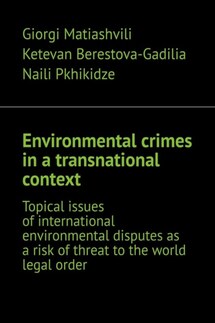Environmental crimes in a transnational context. Topical issues of international environmental disputes as a risk of threat to the world legal order - страница 7
&4 General provisions and the concept of international law of environmental protection
Surrounding Nature Environment – a complex of natural systems, natural objects and natural resources, including atmospheric air, water, land, subsoil resources, flora and fauna, as well as climate in their interconnection and interaction.
A favorable natural environment – such a state of natural objects that form the environment created by human being, as well as the quality of life and conditions that meets the legally established standards and regulations regarding its cleanliness, resource intensity, ecological sustainability, species diversity and aesthetic richness.
Protection of the natural environment – activities to preserve and restore (if it is violated) a favorable state of the ambient environment, prevent its degradation in the process of social development and maintain ecological balance.
The concept and resources of international environmental law.
International environmental law – a set of international legal principles and norms, regulating international relations regarding the protection of the environment from harmful effects, the rational use of its individual elements in order to ensure optimal conditions for the life and health of individuals, as well as the very existence of mankind as a whole.
Significance of international environmental law
The access to regulating relations of the issues of the international level regarding the environmental protection is conditioned by two main factors: the development of scientific and technological progress, a sharp increase in the human population, which leads to an imbalance in world environmental ties (today, humankind does not possess natural enemies capable of regulating its population).
Principles of international environmental law.
The principles of international legal regulation are generally divided into three groups: General (generally recognized) principles of international law; The principles of international law, having environmentally friendly importance; Special (sectoral) principles of international environmental law.
Special principles, formulated in the Stockholm Declaration of 1972, the World Charter for Nature adopted by the General Assembly on October 28, 1982, the Rio de Janeiro Declaration on Environment and Development of 1992 and other documents. The following basic principles should be highlighted:
1. The principle of rational use of natural resources, which obliges states to manage and use natural resources in such a way as not to damage the integrity of ecological systems, as well as to carry out a series of activities for the reproduction and renewal of natural resources (Convention for the Conservation of Antarctic Marine Living Resources 1980, United Nations Convention on the Law of the Sea 1982).
2. The principle of preventing environmental pollution means, that states should not pollute the ambient environment by bringing in various harmful substances into it, which, due to their danger or due to their large amount, exceed the ability of the ambient environment to neutralize and restore themselves. States are obliged by their actions not to transfer damage or hazard from one area to another, directly or indirectly, or to transform one type of pollution into another.
3. The principle of the sovereignty of states over their natural resources means the sovereign right of states to develop their own natural resources in accordance with their policies in the field of nature management, environmental protection and development. But it no longer has an absolute character.






